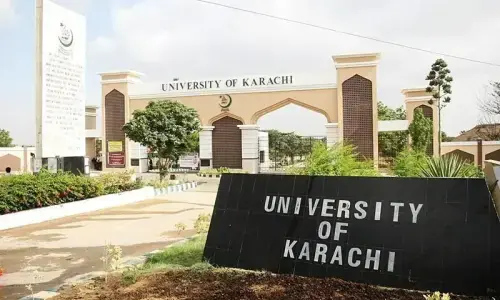KARACHI: The Sindh legislature was informed on Wednesday that close to three million children were out of school across the province for which the government was taking part in an initiative planned by the federal government to offer education to every child as enshrined in the Constitution.
“There are 2,876,324 children ... who are out of school,” said Education Minister Jam Mehtab Dahar while responding to a question filed by Nusrat Abbasi during Question Hour in the Sindh Assembly session.
He said the federal government had planned a national enrolment drive across the country through a provincial strategy to achieve the target of bringing maximum number of those children in schools.
“We are making sincere efforts,” the minister said. “We are confident we’ll achieve the target pretty soon.”
Answering another question jointly filed by Naheed Begum and Rashid Khilji, the education minister said some 582 school in Karachi division and 17 districts of Sindh had been adopted by 102 individuals and organisations.
“Some 13 of those adopters are individuals and the remaining 89 are non-governmental organisations,” said the minister.
Most of the schools [272], which the government agreed to get adopted, have been located in Karachi division; followed by Tando Mohammed Khan where 85 schools have been handed to individuals and organisations.
Some 75 schools in Thatta have been handed to adopters. The district-wise details of other 15 districts are: Badin (31), Hyderabad (29), Khairpur (12), Larkana (five), Umerkot (eight), Matiari (12), Mirpurkhas (seven), Shikarpur (two), Naushehro Feroze (eight), Sanghar (seven), Benazirabad (10), Sukkur (three), Qambar (three), Thar (nine), and Jacobabad (five).
Replying to a question raised by Heer Soho, the minister said some 2,659 schools on the base of need assessment exercise were selected for the rehabilitation and construction works during 2011 to June 2013.
Out of them, he added, 2,161 schools in various districts of Sindh were successfully completed by June 2013. He said the works were carried out under the Sindh Education Reforms Programme.
Responding to another question asked by the same member as to whether 250 new schools had been opened by the Sindh Education Foundation in 10 districts, he said those schools were not established by the foundation, but, they were already established and were previously running under the said programme; they were moved from the development scheme to the regular side.
“All 250 schools are functional,” he claimed, adding, the Rural Based Community Schools [RBCS] programme had signed contracts with 10 NGOs that had been working as partners with the SEF since the start of the RBCS project and meet the criteria of the programme.
“Each NGO has established 25 schools that are mostly old schools and are currently functional,” he said. The minister added that those schools had now been regularised and converted into formal schools from their previous informal status.
He said students in those schools were enrolled and teachers were performing their duties. Some of those teachers had been appointed recently.
“It is responsibility of the NGOs to appoint teachers, to pay salaries, to manage other matters and operate schools effectively.”
Responding to another question whether the members had not been appointed in many educational boards in the last one and a half year, the minister said it was not correct; all members in education boards had been appointed.
Engineer Sabir Kaimkhani asked whether the chief minister had formed a committee to probe alleged irregularities in Sindhi Adabi Board [SAB] and demanded the minister to unveil the findings and subsequent action against those involved.
Mr Dahar said a high-level inquiry into the affairs of the SAB had been conducted by the Chief Minister’s Inspection, Enquiries and Implementation Team in 2011-12. However, he claimed, the report and findings of the committee had not been sent to the SAB.
Replying to another question about the SAB, he said the board had spent Rs15.109 million on publication of books to achieve its aims and objectives during the past three years. The expenditures incurred were approved by the board of governors under the provision of constitution of the SAB. He said Rs5.234m had been spent on publication of books in 2011-12 and Rs5.614m for the same purpose in 2012-13.
MPA Mazahir Amir Khan asked the minister to clarify the reports vis-a-vis direct appointments of principals in grade 18 made by deputy commissioners in public schools in various districts.
Mr Dahar said public schools were autonomous bodies run under the board of governors constituted by the Sindh government under West Pakistan Government Educational and Training Institutions Ordinance (Sindh Amendment) Act, 1974. He added the public schools had their own rules and by-laws and commissioners or deputy commissioners headed those boards of governors. “The board of governors is empowered to appoint principals.”
Published in Dawn, July 27th, 2017


































